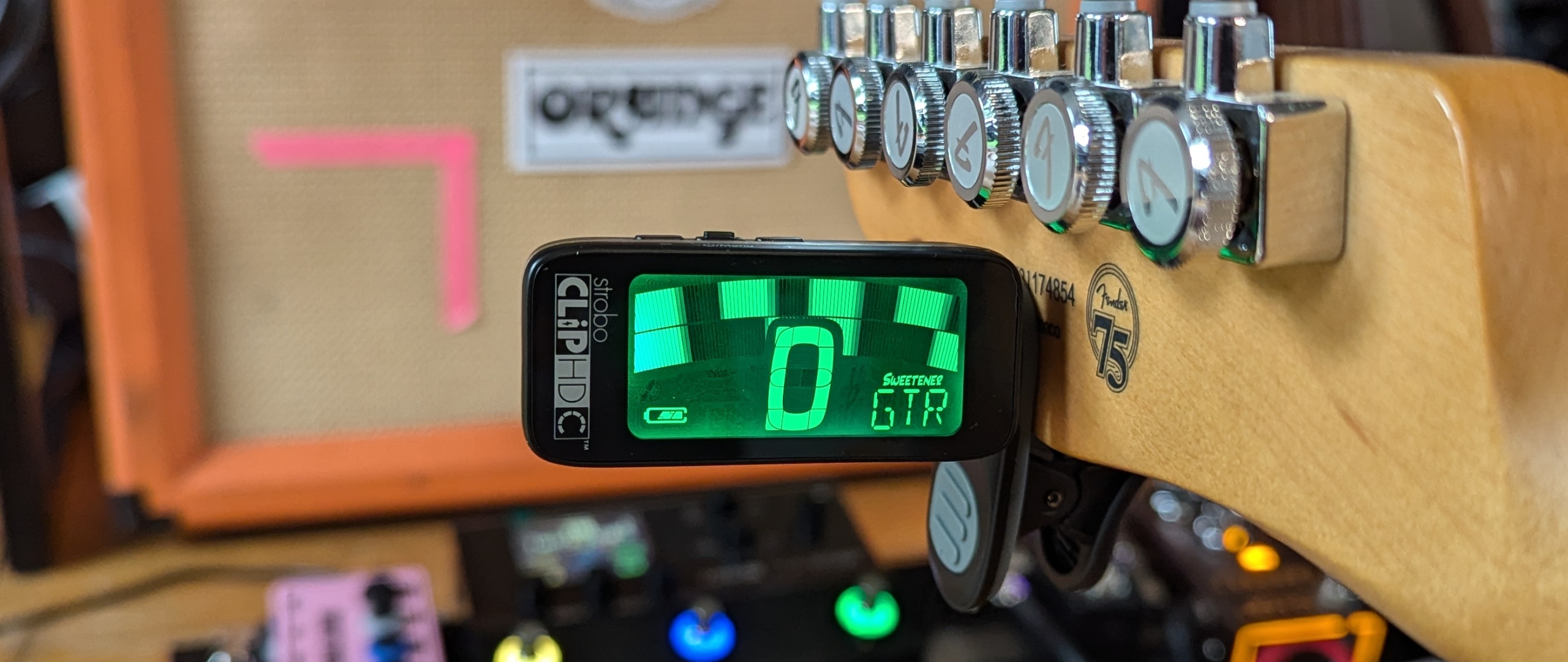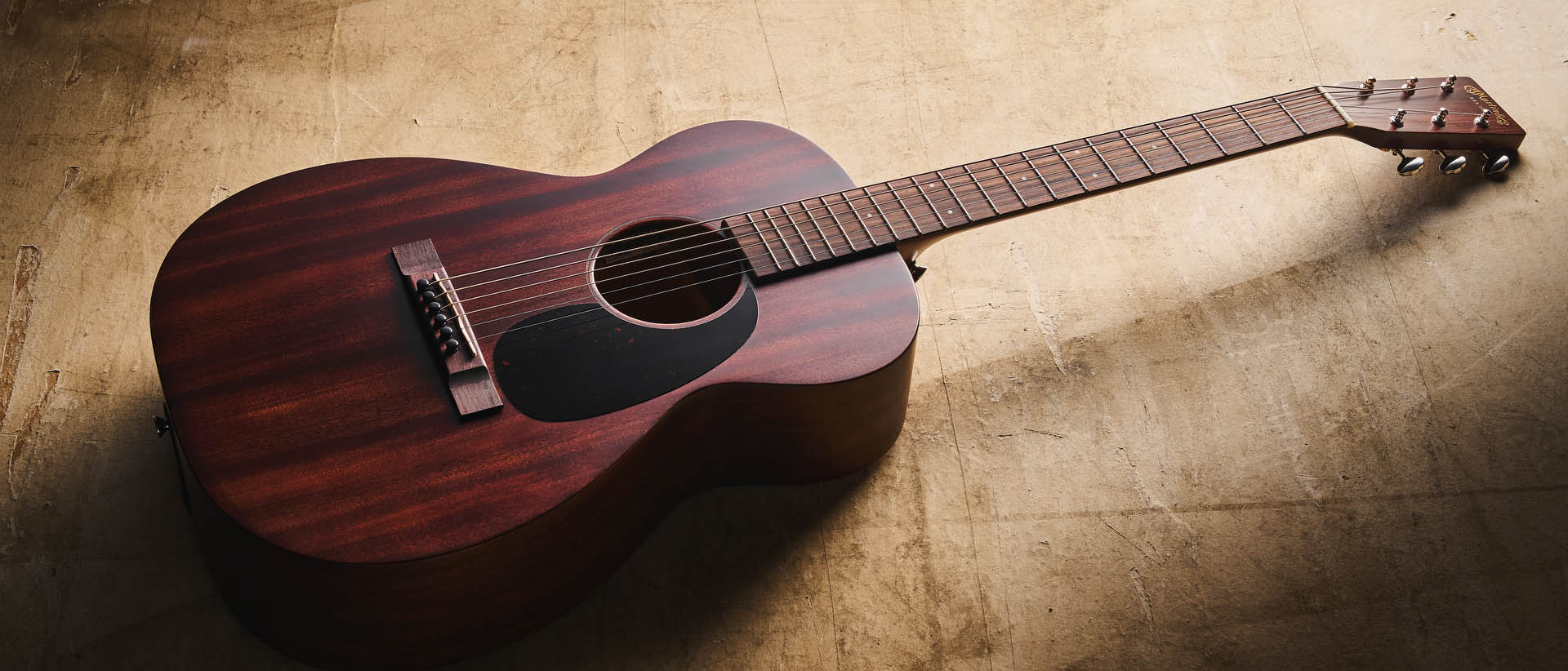Guitar World Verdict
If you want the best clip-on tuner money can buy, there’s no doubt that this is it. Feature-packed and incredibly accurate, it’s got a lot more depth than the majority of the competition. For many players though, that entry price will sting just a little too much.
Pros
- +
Super accurate tuning
- +
Sweetened tunings sound great
- +
Plenty of customization options
Cons
- -
It’s very expensive for a tuner
You can trust Guitar World
When I was asked to review a clip-on tuner I couldn’t help but feel a little bemusement. A tuner is a tuner, right? There’s a million of them out there and they all do a very simple task. Well, it turns out not all guitar tuners are created equal, as we’ll find out with Peterson Stroboclip HDC.
Clip-on tuners have risen in popularity of late as the technology to create them has gotten better and more affordable. Why take a slot on your precious pedalboard when you can just attach one to your headstock?
Worrying about batteries is a thing of the past thanks to USB charging, and clip-on tuners now feature plenty of deeper options that allow you to tweak them to your personal preference.
Peterson Stroboclip HDC review: Features
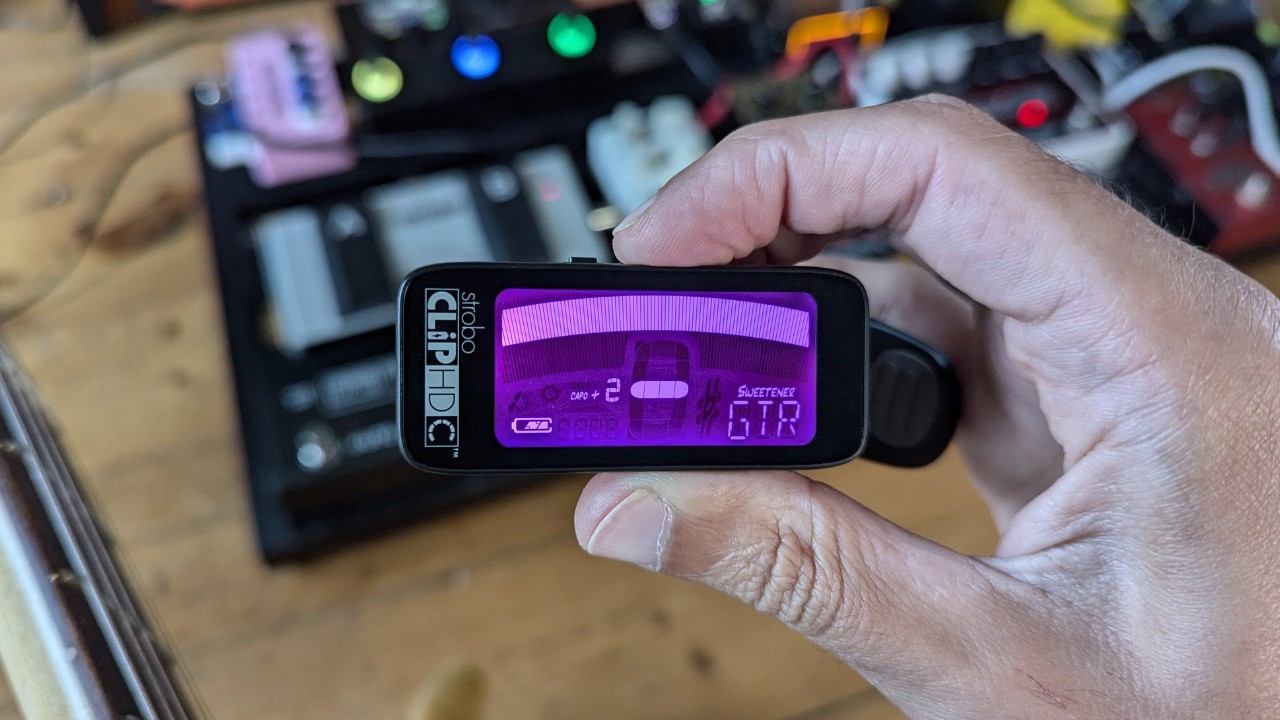
The Peterson Stroboclip HDC promises a tuning accuracy of 0.1 cents which is impressive for a clip-on tuner and amongst the smallest increments you’ll find without plugging in directly. It’ll also track down to 16Hz, so you shouldn’t have any problems tuning the low B on a 5-string bass guitar.
It’s powered by a rechargeable lithium-ion battery that promises 6 hours of continuous use, depending on the color of screen that you use. The LCD screen is plenty bright to be seen in any light condition, and you can also customize certain tunings by color, giving you a quick reference depending on what tuning you’re going for.
The Stroboclip also features something unique called ‘sweetened’ tunings. Instead of using traditional tuning where each note is the same distance from one another, known as ‘equal temperament’, ‘sweetened’ tunings are designed to make chords sound better by tuning certain strings slightly flat or sharp in varying degrees, depending on which instrument is selected.
Peterson Stroboclip HDC: Performance
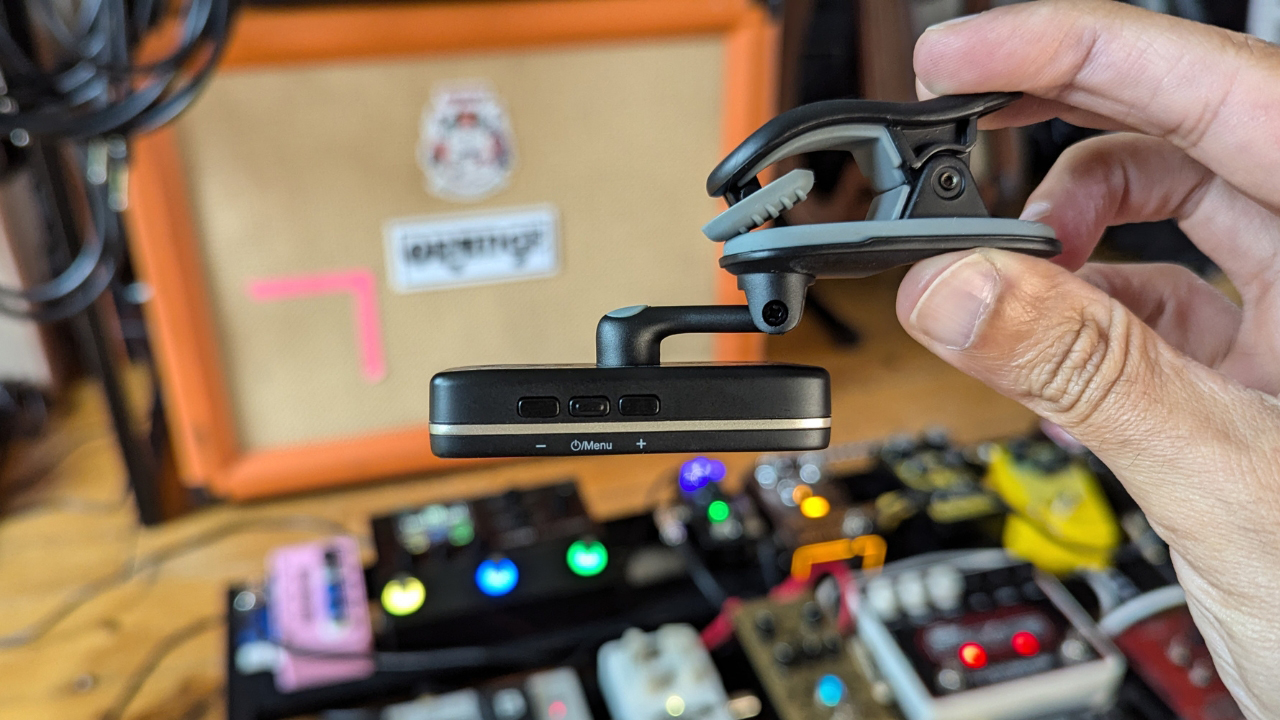
The Stroboclip HDC is controlled via three small buttons on the top or side depending on how you look at it. The center button is ridged to make it easier to pick out from the others on a dark stage, and you hold and press to turn the tuner on.
All the latest guitar news, interviews, lessons, reviews, deals and more, direct to your inbox!
Once it’s on you can use the center button to cycle through the various modes, with the two buttons on either side being used for adjusting whichever setting you’re on. It’s pretty easy to get to grips with, and I didn’t need the manual or a YouTube video to start exploring every nook and cranny of the Stroboclip’s impressive amount of features.
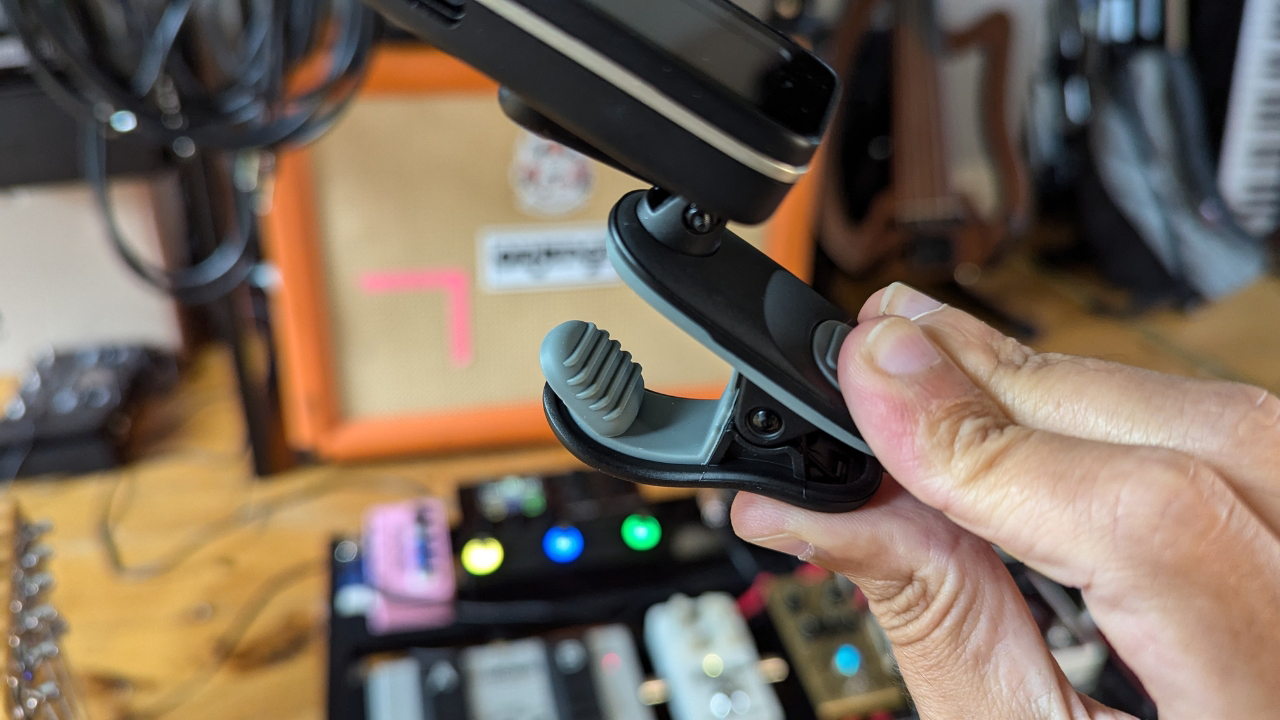
I don’t use clip-on tuners very often, nor do I use a strobe tuner so attaching the Stroboclip to my electric guitar and turning it on was initially baffling. Rather than presenting an up or down arrow to indicate whether you’re flat or sharp, instead, you get moving sets of blocks of cascading sizes that change their direction depending on whether you need to tune down or up.
The aim is to get them to stop moving, and though I consider myself a pretty experienced guitarist, it took me a good while to get used to it. The idea is that it’ll provide more accurate tuning. Did I notice a difference versus my regular Korg Pitchblack pedal tuner? Not really, but for those who want the reassurance that their guitar is as absolutely in tune as it can be, I can see the lure of a strobe tuner versus a regular one.
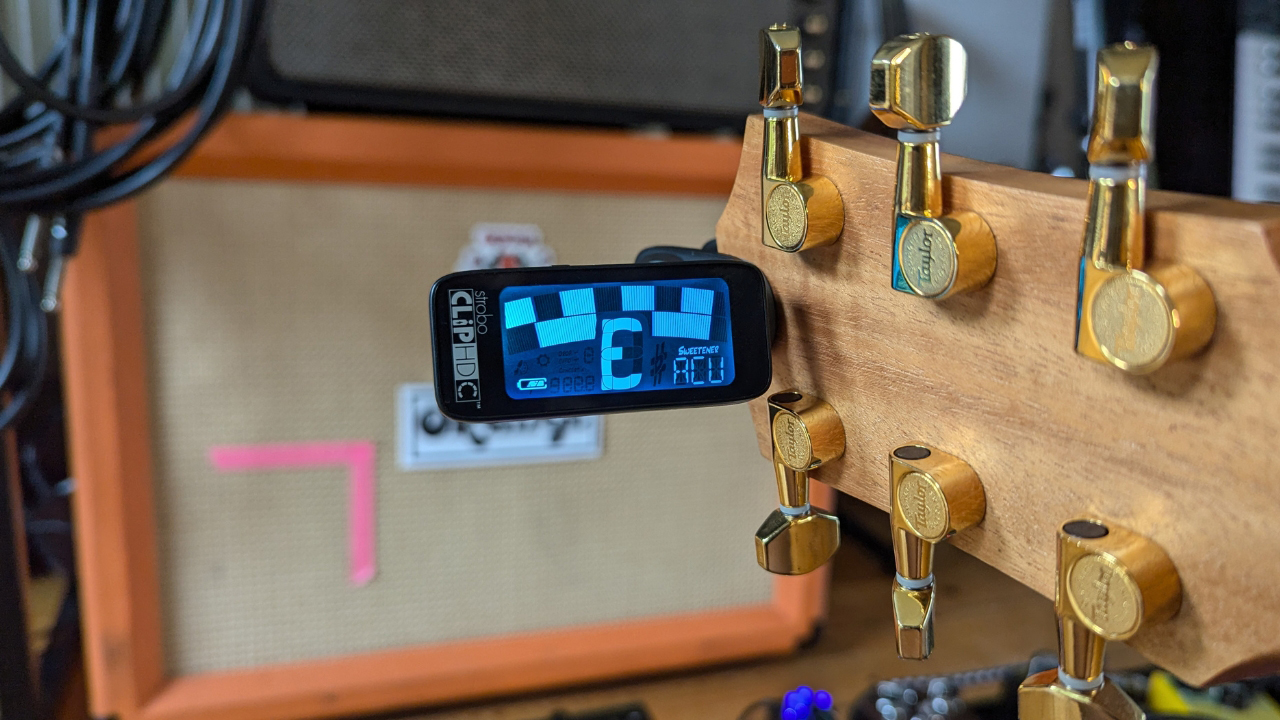
For a tuner, there’s a lot of depth on offer here too. Not least of which are the ‘sweetened’ tunings. You’ve got a huge selection of these tunings to accommodate electric guitar, acoustic guitar, four and five-string bass, lap steel, dobro, and many more. There are over 50 different tunings to play with, going all the way to specific tunings for orchestral instruments.
Trying out the electric and acoustic guitar tunings, again I can’t objectively say that they’re better than my regular tuner. They certainly sound good though. I tried various chord shapes across the neck of my Taylor, as well as single-note playing, and couldn’t find anything to fault with the sound. Ultimately though I value simplicity from my tuner, so I ended up reverting to the regular mode during my time with it.
The ability to change colors is actually really handy too. I tried all of the instances available, ending up settling for green which looked the clearest to my eye. For any colorblind players out there this will be an absolute godsend, and you can assign certain sweetened tunings to a particular color to make things easier to identify.
Peterson Stroboclip HDC: Final verdict
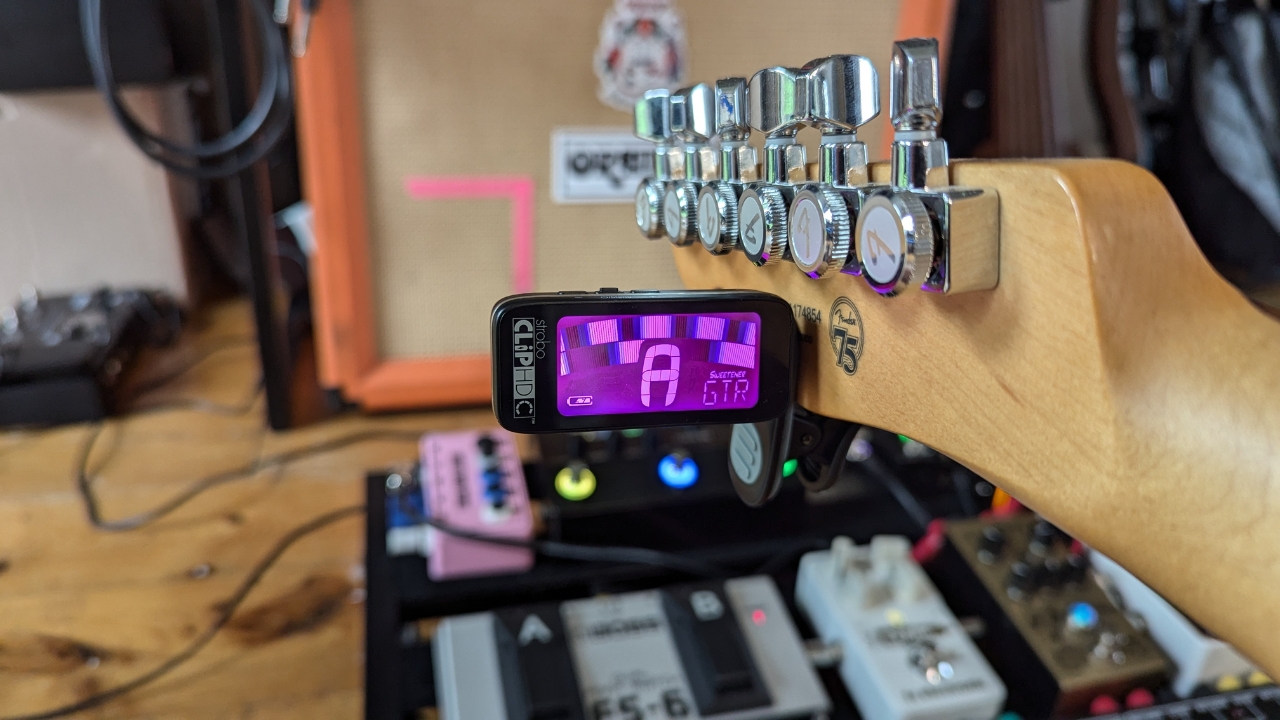
Is any tuner worth $80? Well, I guess it all depends on what you demand from your gear. For those who want the best of the best, then there’s no doubt that Peterson tuners are the pinnacle of that most utilitarian of accessories. No matter how high-end your guitar or how vintage your tube amp is, if you’re not in tune you’re going to sound bad.
Ultimately you’re paying a premium for that accuracy and with anything, once you get to that level of depth the gains become more and more marginal. It means that for a beginner guitar player, the difference between this and a cheaper tuner is going to be impossible to discern. But for the player who’s got a lot of experience, the Peterson Stroboclip HDC could make a big difference.
The Stroboclip is without a doubt the most fully featured clip-on tuner I’ve ever used, and the addition of those ‘sweetened’ tunings offers something different from anything else on the market.
Peterson Stoboclip HDC review: Specs
- Price: $79 / £79 / €89
- Type: Strobe
- Format: Clip-on
- Display type: Strobe, HD backlit LCD
- Reference pitch: Concert A = 390Hz-490Hz
- Tuning range: C0-B6 (16-1975Hz)
- Accuracy: 0.1 cent
- Tuning modes: 50+
- Inputs: Piezo sensor pickup
- Contact: Peterson Tuners

Matt is a Junior Deals Writer here at Guitar World. He regularly tests and reviews music gear with a focus on guitars, amps, pedals, modelers, and pretty much anything else guitar-related. Matt worked in music retail for 5 years at Dawsons Music and Northwest Guitars and has written for various music sites including MusicRadar, Guitar Player, Guitar.com, Ultimate Guitar, and Thomann’s t.blog. A regularly gigging guitarist with over 20 years of experience playing live and writing and recording in bands, he's performed everything from jazz to djent, gigging all over the country in more dingy venues than you can shake a drop-tuned guitar at. When not writing articles for Guitar World, you'll find him making a racket with northern noise punks Never Better.
